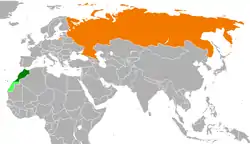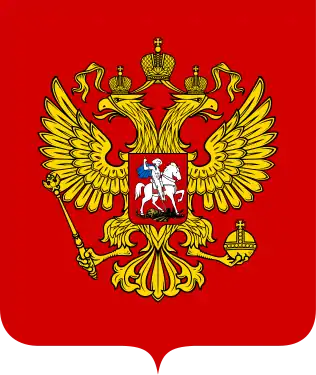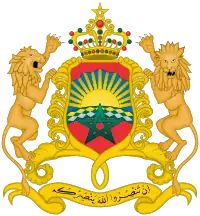Morocco–Russia relations
Morocco–Russia relations (Arabic: علاقات مغربية روسية, Russian: Российско-марокканские отношения) is the bilateral relationship between Russia and Morocco.
 | |
Morocco |
Russia |
|---|---|
Early relations
Bilateral relations between Russia and Morocco have traditionally been very good since the 18th century. Then the mutual relations began with the exchange of goods between the empires of Sultan Mohammed Ben Abdallah and Empress Catherine II.[1]
1900s
In 1906, Arthur Cassini participated in the Algeciras Conference as the representative of the Russian Empire. The Russian delegation supported the French position unequivocally.[3]
1910s
In the late Tsarist years, Russia supported the French colonial positions on Morocco.[4]
1920s
In the course of the 1920s, the Soviet-sponsored Comintern supported Jacques Doriots (then a communist) campaign against the French colonial presence in Morocco.[5]
Additionally, in the 1920s and the 1930s, the Soviet Union did not sign the Tangier Protocol.
Cold War
During the Cold War, Morocco was one of the Soviet Union's most important trading partners in Africa.[6]
In the early 1960s, Soviet-Moroccan relations were developing very well.[7] During the 1964 Moscow protest, approximately 50 Moroccan students broke into the embassy of Morocco in the Soviet Union in Moscow and staged an all‐day sit-in protesting against death sentences handed down by a Moroccan court in Rabat.[8]
In 1978, the Soviet Union invested heavily in the Mining industry of Morocco.[9]
In the context of Western Sahara War, King Hassan II of Morocco said in 1980 that Morocco and the Soviet Union are "at war" in the sense that Soviet arms were supplied to Algeria, which were being shipped by Algeria to the Polisario Front.[10] Unlike other armed liberation movements in Africa, the Soviet Union did not commit to support the POLISARIO Front. The pro-Soviet Party for Progress and Socialism supported the Moroccan government in Western Sahara. Despite POLISARIO Front's open expectation of Soviet support, the USSR refused to take any stand against Morocco. This might be because Morocco was the largest Soviet trading partner in Africa in 1978.[11]
Current relations
_03.JPG.webp)
Russia has an embassy in Rabat, and a consular office in Casablanca. Morocco is represented in Russia by its embassy to Moscow.
In the 2000s, the bilateral trade relations widened significantly, especially in the mining and agriculture sector.[12]
The current President Vladimir Putin had paid a visit to Morocco in September 2006 in order to boost economic and military ties between Russia and Morocco. Morocco-Russian relations are still in constant development, while trade between the two countries reached over two billion dollars in 2011.[13] In March 2016, King Mohammed VI of Morocco visited Russia and met with President Putin.[14] Both sides signed an agreement on mutual protection of secret information.[15]
According to Moroccan media, Russia supports the Moroccan position in the Western Sahara conflict.[16]
After a significant decline in tourism from Europe, the Ministry of Tourism of Morocco is planning to attract more travelers from Russia.
In 2019, the Moroccan and the Russian government agreed on investing into an oil refinery in Mohammedia, that was defunct since 2015. So equipped with a refining capacity of around 100,000 barrels per day, the refinery should later be able to reach 200,000 barrels per day by exploiting the Nador Port facilities. This expansion promises to deliver a number of trickle-down effects, including boosting job creation and infrastructure development, particularly in Morocco's northern regions.[17]
References
- Hamid Ait El Caid: Morocco-Russia relations: who is in more need of the other?, moroccoworldnews.com, 27 February 2014. Retrieved 10 March 2015.
- Paul du Quenoy: Tidings from a Faraway East: The Russian Empire and Morocco, in: The International History Review, Vol. 33 (2011), No. 2, pp. 185–203 (here: 188/189).
- Paul du Quenoy: Tidings from a Faraway East: The Russian Empire and Morocco, in: The International History Review, Vol. 33 (2011), No. 2, pp. 185–203 (here: 194).
- David Stevenson: 1914–1918: The History of the First World War, London 2004, p. 66.
- Susan Whitney: Mobilizing Youth: Communists and Catholics in Interwar France, Durham (NC) 2009, p. 39.
- Stephen Zunes/Jacob Mundy: Western Sahara: War, Nationalism, and Conflict Irresolution, Syracuse 2010, p. 85.
- Saadia Touval: The Boundary Politics of Independent Africa, Cambridge 1999, p. 128.
- Article, nytimes.com, 20 March 1964. Retrieved 26 April 2016.
- Brian Pockney: Soviet Trade with the Third World, in: Edgar Feuchtwanger/Peter Nailor (eds.): Soviet Union and the Third World, London 1981, pp. 30-78 (here: p: 54).
- L. Roberts Sheldon: Morocco says it's 'at war' with Soviet Union, csmonitor.com, 6 May 1980. Retrieved 26 April 2016.
- Yahia Zoubir: Soviet Policy toward the Western Sahara Conflict, in: Africa Today, Vol. 34 (1987), No. 3, pp. 17–32.
- MOROCCO-RUSSIA ECONOMIC RELATIONS: ENERGY, CLEMENTINES, AND EVERYTHING IN BETWEEN, Wikileaks-Cable 12 February 2009. Retrieved 26 April 2016.
- Russia’s ambassador in Rabat says relations with Morocco are "excellent", moroccoworldnews.com, 27 February 2012. Retrieved 27 October 2012.
- Ahmed Charai: What's at Stake in Morocco's Royal Trip to Russia, nationalinterest.org, 15 March 2016. Retrieved 26 April 2016.
- Russia, Morocco sign agreements on mutual protection of secret information, rbth.com, 15 March 2016. Retrieved 26 April 2016.
- Russia Supports Morocco’s Position on the Western Sahara, moroccoworldnews.com, 15 March 2016. Retrieved 26 April 2016.
- Dario Cristiani: Exploiting the Vacuums: Russia and North Africa in the Wake of the Sochi Summit, jamestown.org, 20 November 2019. Retrieved 22 November 2019.
External links
| Wikimedia Commons has media related to Relations of Morocco and Russia. |
- Documents on the Morocco–Russia relationship from the Russian Ministry of Foreign Affairs (in Russian)
- Embassy of Russia in Rabat (in Arab and French)
- Embassy of Morocco in Moscow (in Arab, French and Russian)

